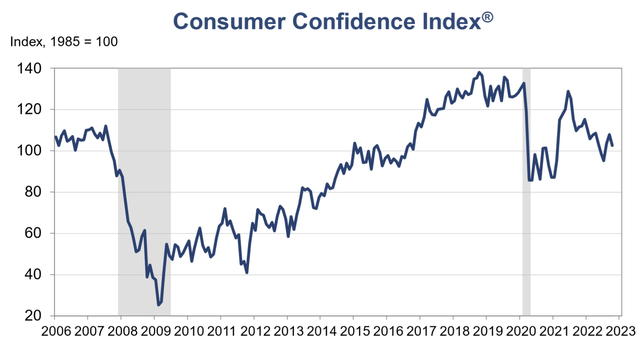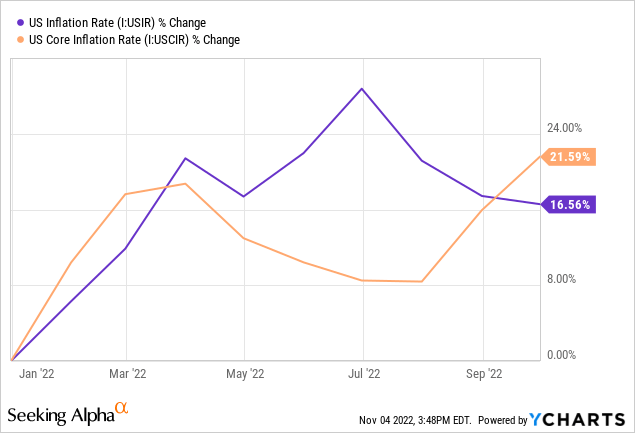Ford: A Noteworthy Update
Ford #Ford


Justin Sullivan
We’ve been a long-time bear of Ford (NYSE:F) stock, and despite many doubting us, we were right with numerous of our past ratings. However, today marks a turning point as we pivot to neutral and exit our strong sell rating.
Our ratings on the stock might seem counterintuitive at times. However, that’s a label you become accustomed to as a contrarian analyst. Additionally, it’s critical to remember that success in the financial markets is generally achieved by buying low and selling high. In essence, being ahead of future market circumstances and not coincidental is key.
Today, we exit our bearish outlook on Ford as we see a few vital turning points occurring; here’s what we discovered.
Existing Bear Case
As we previously predicted, Ford sales eventually declined, with a steep drop in October. The company’s broad-based sales slipped by 10% year-over-year last month, with its retail sales plunging by 18.6%. Although EV sales garnered a 119.8% year-over-year boost, the firm’s SUV and Truck sales fell by 18.2% and 7.7% year-over-year.
The diminishing consumer confidence index should be no surprise, given that interest rates have risen exponentially in the past few months while inflation has remained resilient throughout the latest interest rate hike cycle. Despite staving off the drop for much of 2022, Ford’s sales have eventually pivoted as consumer confidence has dropped. Ford retails durable goods, and there’s significant evidence that durable goods sales recede during rising interest rates.

The Conference Board
Furthermore, Ford recently suffered various supply-related issues. The company recently stated that it had sustained shortages in its blue badges and missed car parts for approximately 40,000 vehicles that retailers had already ordered.
The company’s supply concerns might persist, as China is causing considerable headwinds across global trade because of its prominent stance in processing raw materials. Thus, we consider China a risk to most durable good sales until its zero-covid policies get abolished.
Lastly, Ford wasn’t well-aligned with the broader market for the past few quarters, as its Beta coefficient and standard deviation indicate that it’s a highly volatile stock. The reason why this yields significance is due to the risk-off zeitgeist that dominates bear markets. Investors tend to drift towards low-volatility stocks in uncertain economic (and market) circumstances. Thus, leaving Ford’s stock in the firing line during the latest market sell-off.
Beta 1.38 Standard Deviation 2.93 Click to enlarge
Source: Yahoo Finance; MacroAxis
Potential Turning Point
A few indicators have started to align for Ford stock to stabilize. Firstly, a Fed pivot could be in the offing. The Federal Reserve chose to hike interest rates by an additional 75 basis points this week in an attempt to curb inflation once and for all.
Despite the Fed’s rate hike, we think there are clear economic signs that the Federal Reserve will need to pivot soon and end its rate-hike cycle. For example, recent employment data suggests that unemployment surged by more than anticipated while labor force participation shrunk. Many might say that the decline in labor force participation indicates strong household balance sheets; however, we believe the decline is due to froth in the labor market, with many jobs simply not paying the demanded wages.
Moreover, consumer sentiment is waning (as mentioned before) while non-core inflation is settling due to fossil fuel price leveling. Thus, we believe today’s economy provides a conducive environment for the Federal Reserve to pivot and halt its rate-hiking cycle, in turn providing renewed support to the U.S. consumer.
Despite the central argument being focused on the U.S., the same likely holds true for the European Union and the United Kingdom, as both territories have recently tightened their interest rates aggressively while recession fears remain high.
 Data by YCharts
Data by YCharts
Furthermore, Ford has significant market-based advantages. The company recently reinstated its dividend, and the stock is trading at a deep relative discount. For example, Ford’s income-based price multiples are at levels that we consider severely discounted.
Dividend Yield 3.39% Price-to-Earnings 8.19 Price-to-Sales 0.35 Click to enlarge
Source: Seeking Alpha
The reason why dividend and value stocks are prime in today’s market is due to investors’ preference for high-dividend and value stocks in late-stage bear markets and early-stage bull markets. Thus, providing Ford with the ideal alignment as the market’s seeking direction after a severe drawdown for most of 2022.
Lastly, Ford presents a strong brand identity. The company has a tremendously loyal consumer base, with its sales often staying afloat during the most torrid of economic times. In addition, the firm’s expanding its brand to a new generation of consumers with its highly successful electronic vehicle rollout has garnered tremendous customer traction.
Concluding Thoughts
We’re not yet assigning a buy rating to Ford stock. However, we’ve decided to pivot and drop our strong sell rating on the stock as features such as a potential Fed pivot, Ford’s valuable valuation metrics, the company’s dividend reinstatement, and brand loyalty could save the stock from further drawdowns.